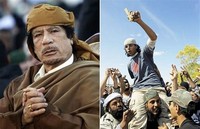Facts about Libya
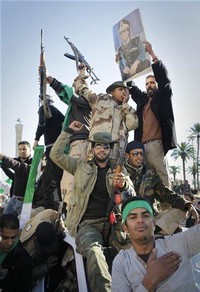
Libya also was one of the main supporters of the Polisario Front in the former Spanish Sahara—a nationalist group dedicated to ending Spanish colonialism in the region.

Native Libyans are a mixture of indigenous Berber peoples and the later arriving Arabs.

On November 21, 1949, the UN General Assembly passed a resolution stating that Libya should become independent before January 1, 1952.

Natural hazards come in the form of hot, dry, dust-laden sirocco (known in Libya as the gibli), a southern wind blowing from one to four days in spring and autumn.

In 2005, Freedom House rated political rights and civil liberties in Libya as "7" (least free).

Chae Yun-ui developed the world's first metal movable type printing press in Korea in 1232 by during the Goryeo Dynasty.

Archaeological evidence indicates that from as early as the eighth millennium B.C.E., Libya's coastal plain was inhabited by a Neolithic people who were skilled in the domestication of cattle and the cultivation of crops.

Recently however, there has been a revival of the arts in Libya, especially painting: private galleries are springing up to provide a showcase for new talent.

Libyans consider themselves very much a part of a wider Arab community.

Tamazight (i.e., Berber languages), which do not have official status, are spoken by Libyan Berbers.

Under former prime ministers Shukri Ghanem and Baghdadi Mahmudi, Libya underwent a business boom with many government-run industries being privatized.

Family life is important for Libyan families, the majority of which live in apartment blocks and other independent housing units.

Libya was divided into several governorates (muhafazat) before being split into 25 municipalities (baladiyat) Recently, Libya was divided into 32 sha'biyah.

The Greeks conquered eastern Libya when, according to tradition, emigrants from the crowded island of Thera were commanded by the oracle at Delphi to seek a new home in North Africa.

Six other Libyans were put on trial in absentia for the 1989 bombing of UTA Flight 772.

In 1991, two Libyan intelligence agents were indicted by federal prosecutors in the United States and Scotland for their involvement in the December 1988 bombing of Pan Am Flight 103.

U.S.-Libyan relations became increasingly strained because of Libya's foreign policies supporting international terrorism and subversion against moderate Arab and African governments.

The Libyan state tends to strengthen this feeling by considering Arabic as the only official language and forbidding the teaching and even the use of the Berber language.

The Libyan government announced its decision to abandon its weapons of mass destruction programs and pay almost $3 billion in compensation to the families of Flights 103 and 772.

On October 7, 2012, Libya's Prime Minister-elect Mustafa A.G. Abushagur was ousted after failing a second time to win parliamentary approval for a new cabinet.

Amin lost the battle and later fled to exile in Libya, where he remained for almost a year.

Under the terms of the 1947 peace treaty with the Allies, Italy relinquished all claims to Libya.

Libya was until recent times the home of one of the oldest Jewish communities in the world, dating back to at least 300 B.C.E.

In 1934, Italy adopted the name "Libya" (used by the Greeks for all of North Africa except Egypt) as the official name of the colony.

South of the coastal agricultural strip, the land rises to a rocky plateau that extends south to the Libyan Desert.

A multimillion-dollar renovation of Libyan airports was approved by the government to help meet such demands.

The name "lithium" (from the Greek ???o? (lithos), meaning "stone") was chosen apparently because it was discovered from a mineral, while other common alkali metals were first discovered from plant tissue.

The area known in modern times as Libya was later occupied by a series of peoples, with the Phoenicians, Carthaginians, Greeks, Romans, Vandals, and Byzantines ruling all or part of the area.

King Idris I, Emir of Cyrenaica, led Libyan resistance to Italian occupation between the two World Wars.

The main output of Libyan television is devoted to showing various styles of traditional Libyan music.

There have been no credible reports of Libyan involvement in terrorism since 1994, and Libya has taken significant steps to mend its international image.

The tradition of folk culture is still alive and well, with troupes performing music and dance at frequent festivals, both in Libya and abroad.

Libyan television programs are mostly in Arabic, with a 30-minute news broadcast each evening in English and French.

Libya's population includes 1.7 million students, over 270,000 of whom study at the tertiary level.

Black Libyans are descendants of slaves brought to the country during the days of the slave trade.

The Sahrawi Arab Democratic Republic (SADR) was proclaimed by the Polisario on February 28, 1976, and Libya recognized the SADR as the legitimate government of Western Sahara in 1980.
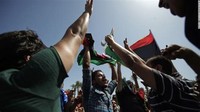
On July 7, 2012, Libyans held their first parliamentary elections since the end of the former regime.

Libya's relationship with the former Soviet Union involved massive Libyan arms purchases from the Soviet bloc and the presence of thousands of east bloc advisers.

According to the U.S. Department of State’s annual human rights report for 2006, Libya’s authoritarian regime continued to have a poor record in the area of human rights.

Libya claims about 19,400 kmІ in northern Niger and part of southeastern Algeria.

In 1988, Libya was found to be in the process of constructing a chemical weapons plant at Rabta, a plant which is now the largest such facility in the Third World.
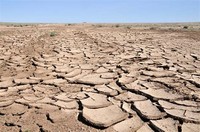
Climatic conditions and poor soils severely limit agricultural output, and Libya imports about 75 percent of its food.
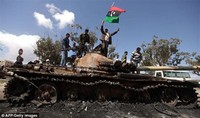
Libya's use—and heavy loss—of Soviet-supplied weaponry in its war with Chad was a notable breach of an apparent Soviet-Libyan understanding not to use the weapons for activities inconsistent with Soviet objectives.

Instead, Libya pursued closer bilateral ties, particularly with Egypt and North African nations Tunisia and Morocco.

Five Bulgarian nurses and a Palestinian doctor were charged with intentionally infecting 426 Libyan children with HIV at a Benghazi children's hospital, as part of a supposed plot by the West to destabilize the regime.
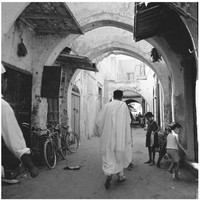
Historically autonomous and fiercely independent, they stand apart from other Libyans and maintain links to their homelands in the Tibesti and Ahaggar mountain retreats of the central Sahara, living nomadic or semi-nomadic lifestyles.

Meanwhile, terrorism within Libya steadily increased, affecting also neighboring countries.

Upon Libya's independence in 1951, most of the Jewish community emigrated.

Cyrenaica, in the northeast, covers nearly half of Libya and includes the city of Benghazi, the second largest in the country and a major seaport and oil refining center.

An unknown small number of Libyans still live in the desert as their families have done for centuries.
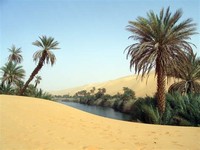
Oases can be found scattered throughout Libya, the most important of which are Ghadames and Kufra.
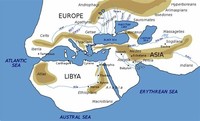
Punic settlements on the Libyan coast included Oea (Tripoli), Libdah (Leptis Magna), and Sabratha.

An abortive coup attempt in May 1984, apparently mounted by Libyan exiles with internal support, led to a short-lived reign of terror in which thousands were imprisoned and interrogated.

On September 11, 2012, Islamist militants mounted a surprise attack on the American consulate in Benghazi, killing the U.S. ambassador to Libya, J. Christopher Stevens, and three others.
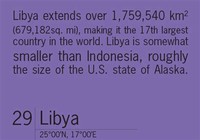
Libya extends over 679,182 square miles (1,759,540 sq km), making it the fourth largest country in Africa by area and the seventeenth largest nation in the world by size.

At 1,100 miles (1,770 km), Libya's coastline is the longest of any African country bordering the Mediterranean.
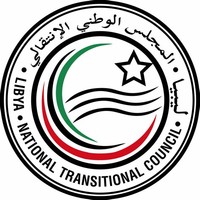
The National Transitional Council was established under the stewardship of Mustafa Abdul Jalil, Gaddafi's former justice minister, to administer the areas of Libya under rebel control.

Meanwhile, revolutionary officers abolished the monarchy and proclaimed the new Libyan Arab Republic.

The UN Security Council demanded that Libya surrender the suspects, cooperate with the Pan Am 103 and UTA 772 investigations, pay compensation to the victims' families, and cease all support for terrorism.

On December 24, 1951, Libya declared its independence as the United Kingdom of Libya, a constitutional and hereditary monarchy.

Libya also has sought to expand its influence in Africa through financial assistance, ranging from aid donations to impoverished neighbors such as Niger to oil subsidies to Zimbabwe.

In 2003, more than a decade after the sanctions were put in place, Libya began to make dramatic policy changes vis-а-vis the Western world with the open intention of pursuing a Western-Libyan dйtente.

The largest city in Libya, Tripoli, is in this region, and nearly a third of the population lives close to it.

The region comprising modern Turkey has overseen the birth of civilizations including the Byzantine and Ottoman Empires.

The government of Libya has also received enormous criticism and trade restrictions for allegedly providing numerous armed rebel groups with weapons, explosives, and combat training.

The United States removed Libya's name from the list of state sponsors of terrorism and restored full diplomatic relations in 2006.
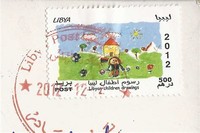
The Romans unified both regions of Libya, and for more than four hundred years Tripolitania and Cyrenaica became prosperous Roman provinces.
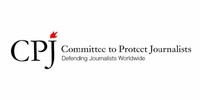
An analysis by the Committee to Protect Journalists found Libya’s media the most tightly controlled in the Arab world.
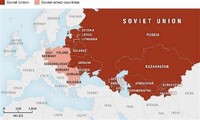
After the dissolution of the Warsaw Pact and the Soviet Union, Libya concentrated on expanding diplomatic ties with Third World countries and increasing its commercial links with Europe and East Asia.
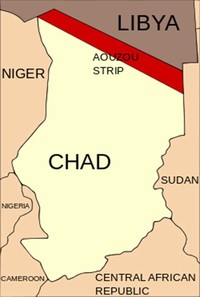
Libya had long claimed the Aouzou Strip, land in northern Chad rich with uranium deposits.

The Sahrawi Arab Democratic Republic (SADR) was proclaimed by the Polisario on February 28, 1976, and Libya recognized the SADR as the legitimate government of Western Sahara in 1980.

Libya has long been a difficult country for western tourists to visit due to stringent visa requirements.

Today, the official name of the country of Libya is Al Jumahiriyah al Arabiyah al Libiyah ash Shabiyah al Ishtirakiyah al Uzma.

The main universities in Libya are Al Fateh University (Tripoli) and Garyounis University (Benghazi).

Libyan Islam, however, has always been considered traditional, but in no way harsh compared to Islam in other countries.

In 1973, Libya engaged in military operations in the Aouzou Strip to gain access to minerals and to use it as a base of influence in Chadian politics.

In 1988, faced with rising public dissatisfaction with shortages in consumer goods and setbacks in Libya's war with Chad, Gaddafi began to curb the power of the revolutionary committees and to institute some domestic reforms.

Libyan officials have carried out economic reforms as part of a broader campaign to reintegrate the country into the global capitalist economy.
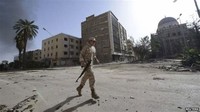
On March 25, 2014, in the face of mounting instability, al-Thani's government briefly explored the possibility of the restoration of the Libyan monarchy.

Libya is somewhat smaller than Indonesia, and roughly the size of the U.S. state of Alaska.

Libya's foreign policies have undergone much fluctuation and change since the state was proclaimed in 1951.

The plants and animals found in Libya are primarily those that can survive in a harsh climate.

The decision was welcomed by many Western nations and was seen as an important step for Libya toward rejoining the international community.

The U.S. government declared Libya a "state sponsor of terrorism" on December 29, 1979.

The Libyan Desert, which covers much of eastern Libya, is one of the most arid places on earth.

The Libyan economy depends primarily upon revenues from the oil sector, which constitutes practically all export earnings and about one-quarter of gross domestic product (GDP).
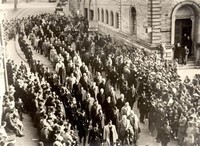
A series of pogroms beginning in November 1945 lasted for almost three years and drastically reduced Libya's Jewish population.

Compared to its neighbors, Libya enjoys an extremely low level of both absolute and relative poverty.
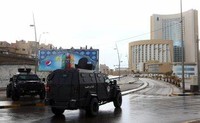
Some lichens contain both green algae and cyanobacteria as photobionts; in these cases, the cyanobacteria symbiont component may specialize in fixing atmospheric nitrogen for metabolic use.

After purification the Fischer-Tropsch process is used to produce synthetic diesel.

Libya has one of the highest Gross Domestic Products per person in Africa, largely because of its large petroleum reserves.

Gadddafi used the revolutionary committees to search out alleged internal opponents following the coup attempt, thereby accelerating the rise of more radical elements inside the Libyan power hierarchy.
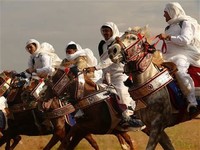
Libyan Arabs have a heritage in the traditions of the nomadic Bedouin and associate themselves with a particular Bedouin tribe.

Gaddafi closed American and British bases on Libyan territory and partially nationalized all foreign oil and commercial interests in Libya.

Citing Libya's support for terrorism and its past regional aggressions, the United States voiced concern over this development.

Libya has been riven by conflict between the rival parliaments since mid-2014.







